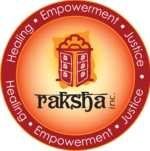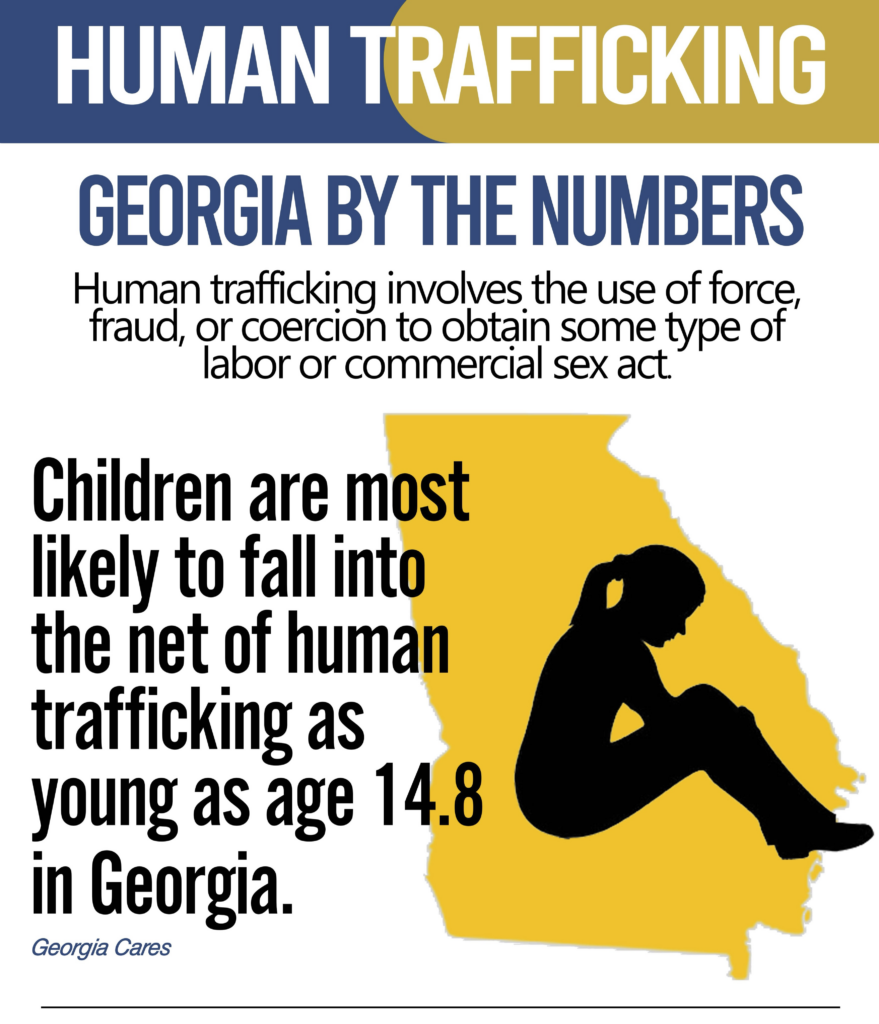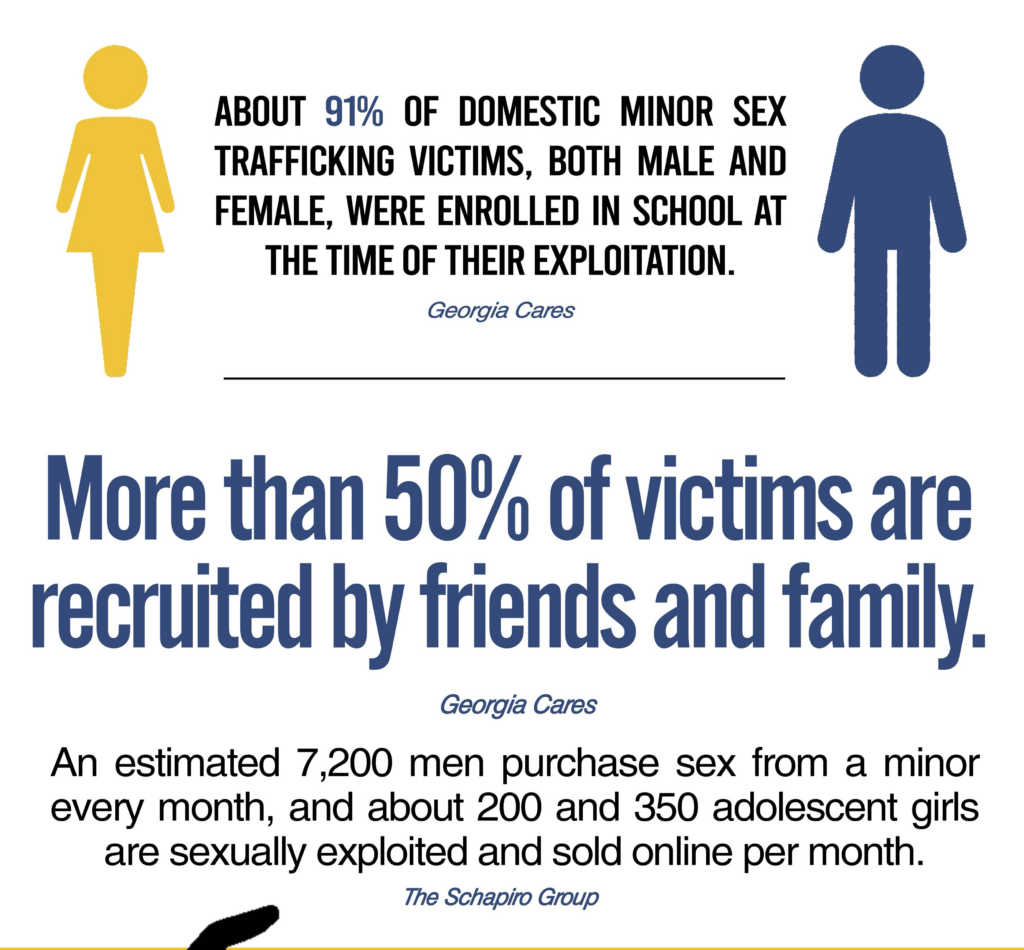January is Human Trafficking Prevention Month. This year’s theme is Activate Connections to Prevent Human Trafficking. Human trafficking cannot be prevented by any one individual, community, organization, or government. To improve the lives of those we serve, we must activate connections throughout the systems that impact individual, family, community, and societal health and well-being. Visit OTIP’s website throughout January for news, resources, and national events.
Learn how Domestic Violence & Trafficking Intersect
Resources for Help
National
National Human Trafficking Hotline
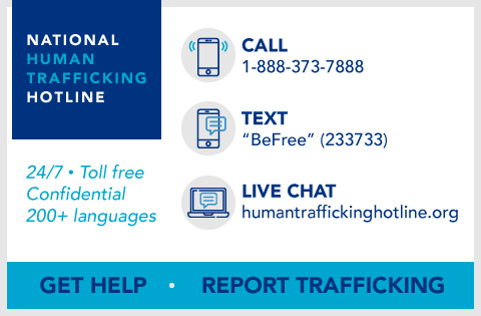
National Center for Missing and Exploited Children (NCMEC)
24-Hour Call Center: 1-800-843-5678
Report Online Child Sexual Exploitation
Cyber Tip Line*: 1-800-843-5678
Georgia
1-866-ENDHTGA (1-866-363-4842)
404-491-6024
404 -299-2185
470-467-3669
Children’s Healthcare of Atlanta – Stephanie Blank Center
404-785-5437
(770) 216-3000
Georgia Bureau of Investigation (GBI)
404-244-2600 (24-hour call center)
(678) 804-8823
1-833-373-3223
Local Events in GA
- Tapestri who provides services for immigrant survivors of violence, is hosting their 7th Annual Human Trafficking Forum on January 19th, 2024, register here.
- District Attorney Office of Dekalb County is hosting a Labor Trafficking Forum on January 31st, 2024, register here.
- Tahirih Justice Center, national nonprofit supporting immigrant survivors of gender-based violence, is hosting a free training webinar on January 30, 2024, at 2:00 p.m. ET, focusing on the intersection of forced marriage and human trafficking. This webinar will provide an overview of forced and child marriage in the U.S., then build on this foundational knowledge to identify the intersecting forms of violence those at risk endure. Participants will be walked through case scenarios involving trafficking dynamics and identify potential warning signs and indicators of forced marriage. Register here.
What is Human Trafficking?
According to the United Nations and WHO, the definition of human trafficking is “[T]he recruitment, transportation, transfer, harbouring or receipt of persons, by means of the threat or use of force or other forms of coercion, of abduction, of fraud, of deception, of the abuse of power or of a position of vulnerability or of the giving or receiving of payments or benefits to achieve the consent of a person having control over another person, for the purpose of exploitation.”
Human trafficking occurs when a trafficker uses force, fraud or coercion to control another person for the purpose of engaging in commercial sex acts or soliciting labor or services against his/her will. Force, fraud, or coercion need not be present if the individual engaging in commercial sex is under 18 years of age. (humantraffickinghotline.org)
There are two types of a severe form of trafficking in persons:
Labor Trafficking — Individuals are compelled to work or provide services through the use of force, fraud, or coercion.
Sex Trafficking — Individuals are compelled to engage in commercial sex through the use of force, fraud, or coercion. When a person under 18 years old is induced to perform a commercial sex act, it is a crime regardless of whether there is any force, fraud, or coercion.
Who is at risk?
According to the Administration for Children & Families, individuals from any class, religious, cultural, or ethnic group can be targeted in human trafficking schemes. The following groups are especially vulnerable:
- Individuals who have experienced childhood abuse or neglect
- Undocumented immigrants
- Racial and ethnic minorities
- Survivors of violence
- Lesbian, Gay, Bisexual, Transgender, and Questioning (LGBTQ) individuals
- Communities exposed to intergenerational trauma
Where, Who & What?
Trafficking can happen anywhere. The National Human Trafficking Hotline identified at least 25 types of human trafficking. Traffickers can be any gender or age — some can be strangers, but most are peers, friends, romantic partners, or family members. The Polaris Project busts some common myths vs. facts on what human trafficking is.
What are the signs? Check out a comprehensive list on some potential indicators of trafficking.
Ways to help prevent Human Trafficking: Learn 10 ways you can help end trafficking, including spreading the word that demand fuels exploitation and thinking about where you eat and how you shop.
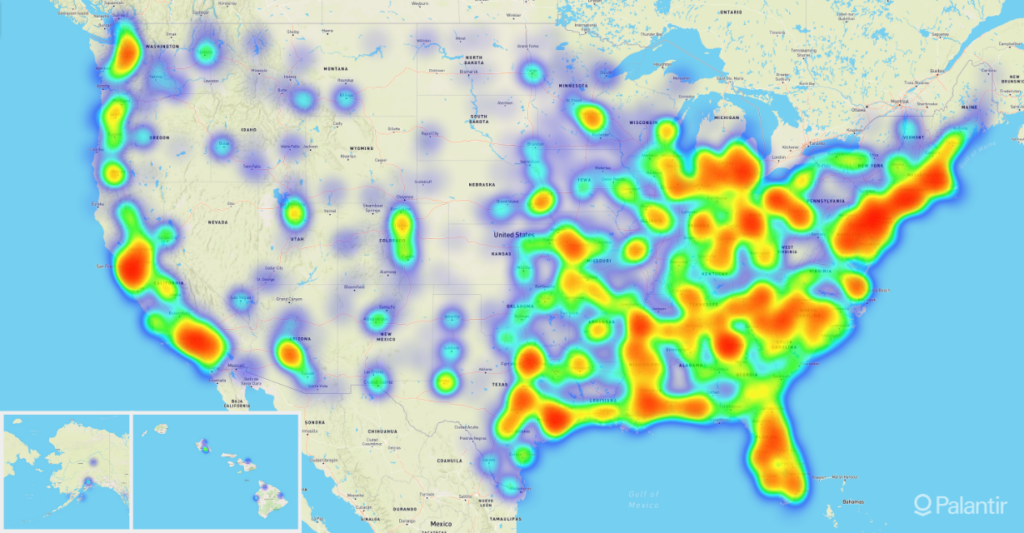
According to the Polaris Project, who operates the U.S. National Human Trafficking Hotline, in 2021, 10,359 situations of human trafficking were reported to the U.S. National Human Trafficking Hotline involving 16,554 individual victims. From the map to the left, the southeast and northeast tend to be hot spots, with Atlanta being in the top 20 cities with the highest reporting of human trafficking.
Human Trafficking in GA
Raise Awareness of Human Trafficking by Wearing Blue on January 11
January 11 marks National Human Trafficking Awareness Day, also known as #WearBlueDay. On this day, Blue Campaign invites you to:
- Wear blue, the international color of human trafficking awareness, to state your commitment to help save lives. Need inspiration? See how others have participated in previous years.
- Post a photo of yourself, or with others, on social media using the hashtag #WearBlueDay. You can also download ready-to-use #WearBlueDay graphics and captions to post on your social channels to spread the word.
- Empower others in your community to do the same.
Follow @DHSBlueCampaign on Facebook, Twitter, and Instagram and visit DHS.gov/Blue-Campaign/WearBlueDay for more information about #WearBlueDay, upcoming events, and other anti-human trafficking efforts in January and throughout the year.
